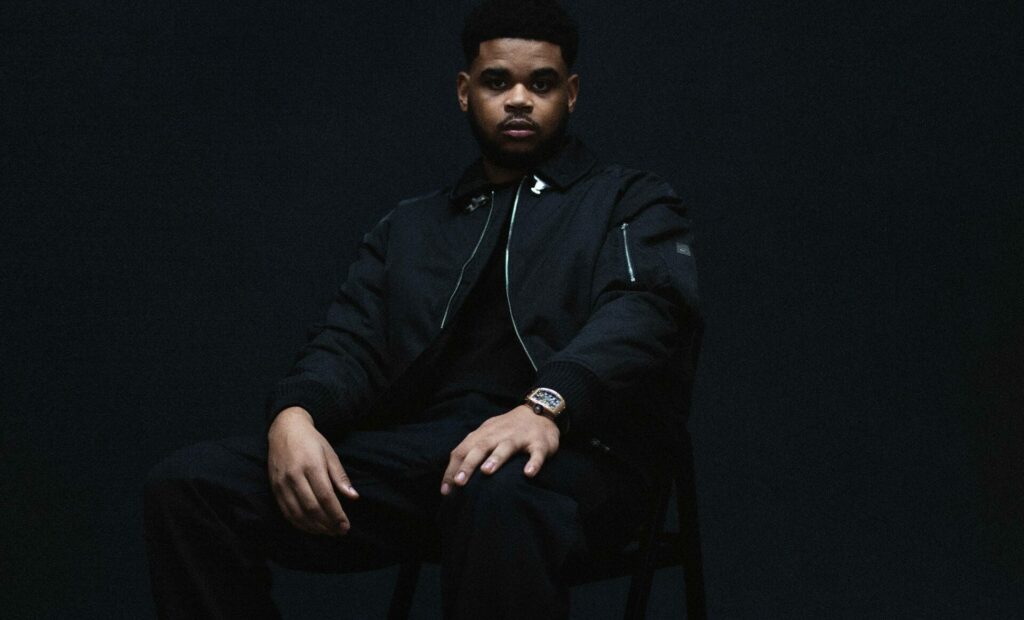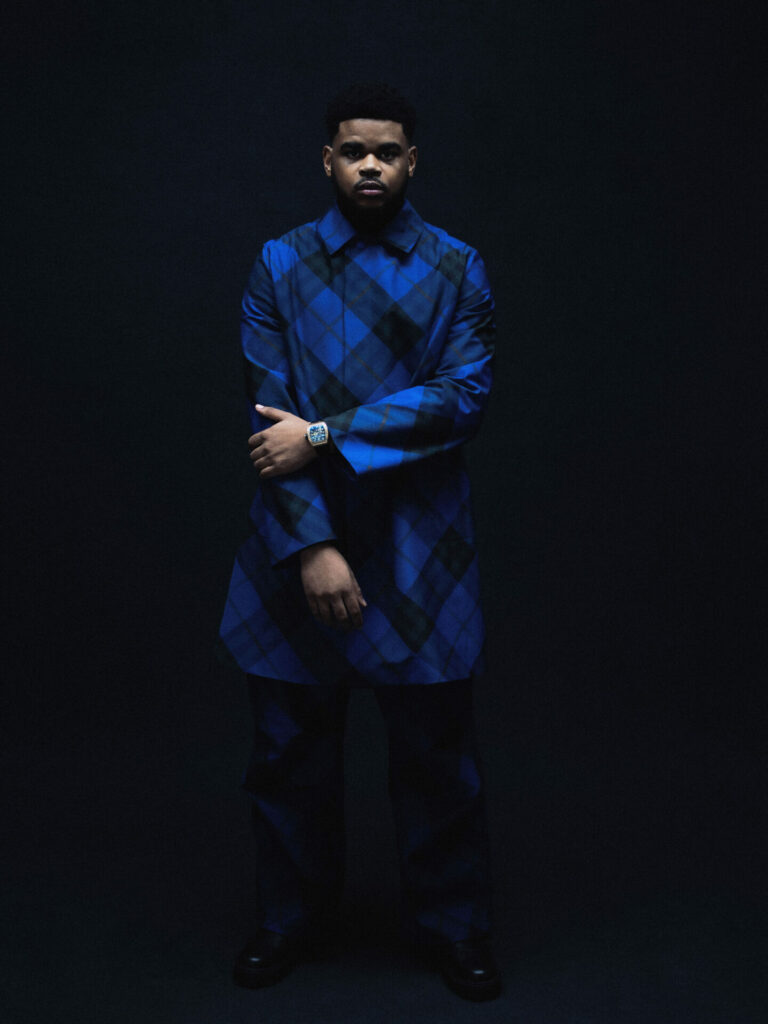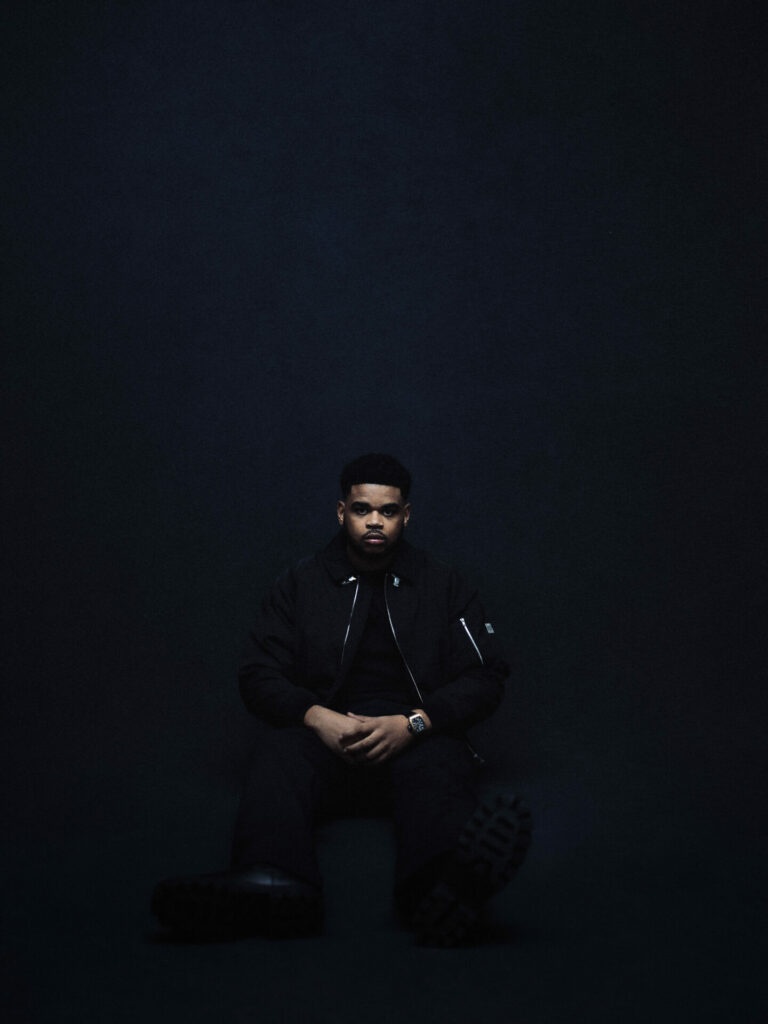Behind The Mask: K-Trap on revealing his true personality for the first time
Since he dropped his face covering, MOBO Award-winning drill star K-Trap has preferred to project his real self rather than an enigma, and his upcoming debut album Smile?, about mental health, is the soul-baring result

Masks in rap have become an irrefutable trope. Elusive. Enigmatic. Cryptic. It’s a way for artists to express a dual persona. However, one consequence for those who wear them is that through the barrier they cannot be humanised, and they are perceived as masked musicians attempting to scurry away from the carnage that can come with fame.
It’s a revelation K-Trap has come to terms with since he abandoned his face covering. “Why would you even care, or why do you even want to know why someone with a mask is happy or sad? You can’t even see them to know them,” he says.
Meeting the rapper in a studio in Westminster, it is evident from his comfortable manner that this place is his oasis. It’s been five years since he decided to shelve his balaclava in 2019 and reveal his identity to the world for the first time via the music video to single ‘Big Mood’, and his career has been on full throttle ever since. From gold-certified track ‘Warm’ climbing to number 17 on the Official UK charts in 2022 to bringing home a MOBO Award for Best Drill Act this year — for the second time in a row — and receiving his first Brit Award nomination, his accolades continue to pile beyond belief at the tender age of 28.
Now, he is fired up for the release of his debut album, Smile?, at the end of May. The title alludes to pleasure, amusement, good intentions and belonging. In his current era, K-Trap feels free to fully embrace his creativity. “I feel like with the mask on, I wouldn’t be able to be the person I am now, wouldn’t be able to express and paint these pictures that I’m about to paint in the album,” he says.
On it, the rapper wrangles with the leap from being quite low-profile to having to adapt to the overfamiliarity that comes with fame. “Apart from music, I don’t give off much of myself so far,” says K-Trap candidly. “How I’ve been and where I’ve come from, we don’t open up and let people in. Now I’m transitioning to being more open and showing more of my character outside of the music.”
For those with attentive ears to listen, K-Trap’s debut album intends to contribute to the broader theme of mental health, with Smile? taking us on a journey into K-Trap’s complex emotional well-being. Throughout the project, he delves deep into his emotions and confronts them head-on. “The reason why my album will contribute to conversations around mental health is because making the music I’ve been making, people think that it’s very dark and one-way,” says K-Trap. “To have someone like me, with respect and credibility, I have to open up more, and showing different emotions will encourage other people to do the same. When it comes to mental health, the people that stand at the forefront aren’t normally from similar walks [of life] as me, and to see someone from a similar background go through the same pain as you and do something different is encouraging.”

As K-Trap is considered the godfather of UK drill music by various cultural tastemakers, you would expect the genre to be playing constantly in his headphones. But in reality, drill plays a minuscule role in his daily life. “It’s not that I don’t listen to drill,” he says. “I’m a mood person, and whatever I feel today is what I listen to. It could be drill, but it’s not likely to be drill. It could be hip-hop, R&B, slow jams, or Afrobeats. I can even listen to instruments —that’s how I am.”
In the middle of some banter about our musical perspectives, K-Trap whips out his iPhone to play what was at the top of his playlist this morning. “Tell me what you want (Mmm) / Tell me what you need (Ah, yeah)” — the melodies of Dru Hill’s ‘Tell Me’ vibrantly echo through his phone speakers while K-Trap bobs his head with a slight smirk on his face, revealing another of the many sides of the young mogul. “I was just listening to this song in the gym,” he confesses with a chuckle.
Balancing personal vulnerability with the more rigid exterior conveyed by his music is a critical challenge for K-Trap to overcome. “It’s a hard one because when you’re known for certain types of stuff, it’s like a smudge on your name,” he says. Like a mark blotted stubbornly on a white piece of fabric, it can be difficult for K-Trap to navigate public perception outside the bounds of others’ opinions. “People don’t think you have emotions and don’t think you can be sad or something,” he says before reflecting on his experiences. “The same way I was saying to you, I was going to the gym today and listening to slow songs. I made a snap video singing to one of the songs, and a few people messaged me saying, ‘You changed.’ I’m like, ‘Bro, I’m just listening to a song!’ It’s a bit frustrating. If I wanted to, I couldn’t tell people if I was heartbroken or going through things.”
As well as individual accolades, the past year has also seen K-Trap win plaudits for his collaboration with Headie One. On 22 September 2023, K-Trap and Headie One dropped their highly anticipated joint project, Strength to Strength. The mixtape comprises 10 tracks, each infused with 808 beat sequences and fast-paced high hats. K-Trap and Headie One have perfected the art of releasing music frequently without compromising on quality, which earned them a nomination for Group of the Year at the 2024 Brit Awards. “On the nomination, there’s not much I can speak about,” says K-Trap. “We’re not a group, if I’m being honest, but we’ll take it. I understand where they’re coming [from] with it. Headie One and I have a lot of chemistry,” he says. “We just do what we do best. There’s nothing technical about it — he’s changed his life; I’ve changed my life, and we’re both just trying to win.”
in rap, it’s easy to be swayed by the meteoric flaunting of wealth and overindulgence in luxuries: jewellery, watches, cars, houses, 1942 tequila bottles, and so on. But fatherhood brings K-Trap a more gratifying flex. “My love for being a dad is a much more important happiness,” he says. “It gives you more reason to take this thing as far as you can go and keep your foot on the gas; it’s more motivation.”

This year, K-Trap has decided to become an investor in rapper friend Krept’s Black-British-owned baby hair and skincare business Nala’s Baby, alongside Anthony Joshua, Nafe Smallz, Yung Filly and Jourdan Dunn, among others. Commenting on the endeavour, K-Trap says, “Investing in the right business is important. Krept is my close friend, and he’s a role model; he’s helped me greatly in and away from music. It’s a no-brainer for many reasons: one, because of who the person is; two, because of how it’s come about; and three, because I have a child myself.”
Balancing commercial success and maintaining the authenticity that defines his influence across Britain is paramount for K-Trap. “In your life, there are different stages for different things. I know my roots; I know where I’ve come from. But if I were to make a commercial song now, it would be because I want to make a commercial song; so, as long as I want to make it, I’m staying true to me,” he says. “I’ve got certain principles and morals, but I’ll definitely exercise being a musician and not just a drill artist.”
With the constant flow of favourable outcomes manifesting in K-Trap’s life, it’s become impossible to dispute his imprint on the UK scene. Acknowledging the positive success of each of these moments is essential to him. “It will be weird for me not to recognise my achievements over the years or getting nominated for these things,” he says. “Don’t wait until it’s too late when I don’t need or can’t even smell the flowers.”
His advice for young Black men trying to pivot and stay on the path to success is to remain diligent, maintain composure and stick to the grind. “If you want to grow and do good for yourself, you have to do just that. There’s no going around it; it’s that simple. There are no excuses. It’s now or never.”
